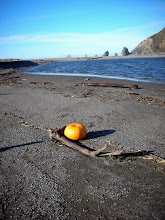After a few years of tiptoeing around the issue, the National Park Service finally appears ready to tackle global warming, or global climate change, or whate’er you choose to call it. From an inside perspective, it’s not as if we were ever told to not talk about the issue, or to use veiled code words so as not to piss off the public, or to bury the discussion. Nothing ever came down from my local bosses nor the higher-ups in Washington telling us to stay quiet.
Internally, our collective reluctance was likely more about witnessing the Bush administration’s efforts at suppressing science across the government, at much higher levels than ours, especially when that science challenged the political perspectives of this administration. In that light, and behind closed doors, we wondered, “What can we say? What can we talk about that won’t get us in trouble? How far can we really go?” Our answer? Let's just wait a bit and see what happens when we get new management in 2008.
But the self-imposed muzzle on addressing global warming in parks appears to be coming off. You’re beginning to see a few parks taking the issue on more directly. The NPS has created a “Climate Friendly Park” initiative with several parks committing themselves to “greening” their operations and facilities. They’ve added climate change as a critical issue on the agency’s website. Regional groups are just now beginning to discuss how and where to incorporate these ideas into the parks’ interpretive messages.
All well and good, but the next step, the more critical step in my idiot opinion, is turning the parks’ rangers and publications and websites and visitor centers loose to advocate for significant behavioral changes amongst us humanoids to slow the inevitable. Our “Climate Friendly Parks” will serve as examples of sustainability for others to follow….but is that enough? Can we save the world by changing light bulbs and driving Priuses (Priae?)?
I don’t think so. I’m also not sure that the NPS is yet fully willing to jump into the contentious fray that argues for steering us away from our petroleum based lifestyle entirely; or to consider looking beyond scenic values or local wildlife preservation to accommodate giant wind turbines on mountain ridges or windy coastlines; or to challenge the existing Americo-Christian ethic that requires human dominion over the planet.
Just one guy’s view of the things we need to be thinkin’ about.
A workshop, presented by a guy we paid to fly down from Alaska last week (in jumbo jets and rental cars), is one example of this nascent attempt at educating us rangers. Unfortunately, it was light on real climate change information, not effectively presented, and didn’t create within our small group eager acolytes running into the streets to warn us all of our impending doom should we continue to drive around our neighborhoods gawking at blinding Christmas light displays from the faux leather captain's chairs of our overheated, middle-east fueled monster cars whilst sucking down corn-filled mega-coffees in plastic cups.
It was not a stellar seminar, but there were a few little nuggets of information or inspiration that found their way into my notebook, perhaps not thoughts original to the speaker, but worthy of filing away in the nether recesses of my feeble mind as we look at incorporating this critical message under the redwood canopy. A few of those quick and cheap revelations follow thusly, transcribed almost verbatim from my recycled paper notebook:
Our global climate has been in a relatively stable for the past 10,000 years. The past 10 millenia have also seen the rise and flourishing of human civilization. Coincidence?
Carbon dioxide remains in the atmosphere for about 100 years. Even if we stop producing it tomorrow, the warming impacts we produce today will remain into the next century. We are still breathing the carbon dioxide emitted from Henry Ford’s first car.
Consider the social element of climate change. How do we, or will we, respond? Consider climate change not as a natural phenomenon, but as a cultural one.
What can we do? What must we be telling people? That we must be able to adapt to the inevitable changing environment, and, we must change the way we live.
It’s under our control. Will global climate change produce a moderate warming that we humans can adapt to, or will it be a catastrophic warming that will change life on the planet forever?
The stone age didn’t end because we ran out of stones. It ended because we discovered a better way to live.
We don’t need to destroy ourselves to make ourselves comfortable.
Subscribe to:
Post Comments (Atom)



No comments:
Post a Comment